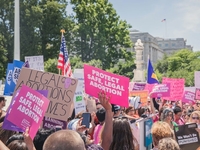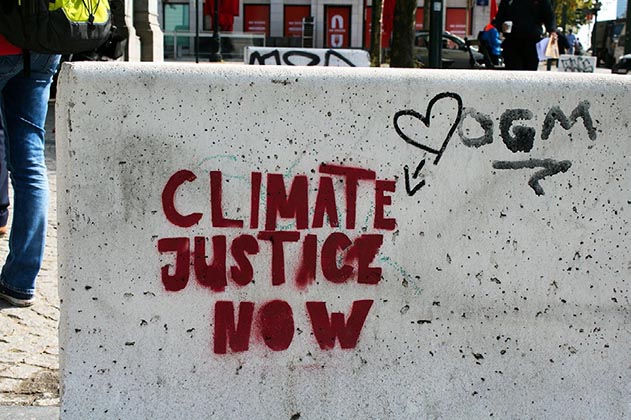A second Trump administration would have guaranteed catastrophic climate change, but the prospects for a Green New Deal-type mobilization under a Biden-Harris administration seem dim. President-elect Biden’s commitment to climate action is more aggressive than any previous administration’s, to be clear, but the vision and ambition of the Green New Deal (GND) are missing, not to mention that contending with a likely hostile Senate will severely limit the new administration. If the prospects of a federal GND seem unlikely, the question then becomes, can state and local efforts reach the scale necessary to realize an equitable and just low-carbon transition? State-level climate initiatives can provide a path to a just low-carbon transition but only if social and economic justice concerns are integrated into climate policy.
Although conservatives weaponized the Green New Deal as coercive governmental control, the GND is not a detailed, prescriptive article of legislation. Rather, it is a nonbinding resolution calling on the federal government to adopt an ambitious, Keynesian program that addresses the dual crises of inequality and climate change within a ten-year time frame. The ten-year time frame aligns with expert consensus that dramatic reductions in greenhouse gases must occur by 2029 to stave off the worst impacts from climate change. By understanding that climate change and inequality are linked, the vision of the GND expands beyond the narrow, technocratic framework of emissions reductions. Understanding and addressing people’s material conditions integrates climate change into social and economic considerations, rather than approaching climate change as a separate and distinct challenge.
The integration of social and economic considerations is a much-needed development for climate change advocacy. Moving from technocratic solutions, such as the past myopic focuses on a carbon tax or a cap-and-trade program, climate advocates across the political spectrum have largely converged on three guiding principles for climate action that integrate social and economic concerns into climate policy. Referred to as “Standards, Investment, and Justice,” the common thread among different climate advocacy efforts is a call for zero or net-zero emissions, large-scale public investment in low-carbon sectors and infrastructure, and social and economic justice concerns – creating good, union jobs, transitioning fossil fuel workers and communities, and protecting marginalized communities that will be hit first and worst by the impacts of climate change.
Given that President-elect Biden announced climate change as one of the transition priority issues and appointed a presidential envoy for climate change, there is reason to believe climate change will indeed be a priority for the new Biden-Harris administration. However, while there is a sense of relief to have an administration that believes in climate change, the fight for a just low-carbon transition becomes more difficult in many ways because the social and economic considerations – which are what ensures a “just” transition – are the most vulnerable to being removed by a politically moderate administration and a hostile Republican Senate. The immediate post-election attack by moderate Democrats on progressive issues, such as Medicare for All and defunding the police, indicates that racial and economic justice concerns will not have the strong support necessary to advance through a hostile Senate.
With federal action to ensure a just low-carbon future seeming uncertain, at best, attention shifts to the state level for the push toward an equitable low-carbon transition. In fact, even before the Trump administration, states were leading the way on implementing ambitious climate policies. However, as at the federal level, whether these climate policies are just will depend on policy creation and implementation. When California adopted a cap-and-trade program, environmental justice advocates sued to stop the program because of the negative impact cap and trade would have on environmental justice communities. The lawsuits were ultimately unsuccessful, and the organizations that brought the suits received considerable backlash from traditional environmental organizations. A recent evaluation of the cap-and-trade program found that the environmental justice concerns were well founded and that localized pollution had increased in vulnerable communities since cap and trade was implemented. Moreover, California is not on track to meet its greenhouse gas emission reduction targets, despite the promised goals of cap and trade.
In contrast, New York State passed the most ambitious climate policy in the country, and fundamental to its success was a broad-based, multi-issue coalition that centered equity provisions. Rather than focus only on emissions reductions, the Climate Leadership and Community Protection Act prioritizes investment in vulnerable communities, and the entire climate bill was also contingent upon a companion bill also passing that created a permanent environmental justice advisory board, among other provisions. The linking of justice and climate resulted in ambitious and equitable climate policy.
State-based climate jobs efforts also provide models for a just low-carbon transition. The fundamental ethos behind these efforts is that the dual crises of inequality and climate must be addressed simultaneously. Replacing fossil fuel jobs, which tend to be higher paying and more likely union, with low-wage, low-quality renewable energy jobs may reduce greenhouse gas emissions, but it is not a just transition. And the failure of past transitions to support workers and communities, such as deindustrialization, make fossil fuel workers all the more resistant to another forced transition. State-level initiatives, such as Labor Leading on Climate and the Climate Jobs National Resource Center, engage state and local labor unions to advance pro-worker, pro-climate policies that inextricably link quality job creation with emissions reduction. These efforts are particularly effective in that they can harness the political power of labor unions, as evidenced by Climate Jobs New York’s successes, including a pledge of $1.5 billion to create 40,000 climate jobs.
With equity and justice provisions at risk of being pushed aside in a Biden-Harris administration, state-level efforts must lead the way in advancing a just transition. Ultimately, given the scale and scope of transitioning away from fossil fuels, addressing the climate crisis requires national and international efforts. However, climate policy cannot silo economic and social considerations away from emissions reduction. State-level efforts can provide a road map for how to advance a just transition and further cement the integration of inequality, social injustice, and climate.
J. Mijin Cha, Occidental College, USA <mcha@oxy.edu>




















